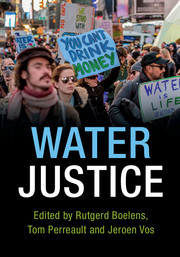Book contents
- Water Justice
- Reviews
- Water Justice
- Copyright page
- Contents
- Contributors
- 1 Introduction: The Multiple Challenges and Layers of Water Justice Struggles
- Part I Re-Politicizing Water Allocation
- Part II Hydrosocial De-Patterning and Re-Composition
- Part III Exclusion and Struggles for Co-Decision
- Introduction: Exclusion and Struggles for Co-Decision
- 10 Indigenous Peoples and Water Governance in Canada
- 11 Sanitation Justice?
- 12 Uniting Diversity to Build Europe’s Right2Water Movement
- 13 Everyday Water Injustice and the Politics of Accommodation
- 14 Sharing Our Water
- Part IV Governmentality, Discourses and Struggles over Imaginaries and Water Knowledge
- Index
- References
12 - Uniting Diversity to Build Europe’s Right2Water Movement
from Part III - Exclusion and Struggles for Co-Decision
Published online by Cambridge University Press: 26 February 2018
- Water Justice
- Reviews
- Water Justice
- Copyright page
- Contents
- Contributors
- 1 Introduction: The Multiple Challenges and Layers of Water Justice Struggles
- Part I Re-Politicizing Water Allocation
- Part II Hydrosocial De-Patterning and Re-Composition
- Part III Exclusion and Struggles for Co-Decision
- Introduction: Exclusion and Struggles for Co-Decision
- 10 Indigenous Peoples and Water Governance in Canada
- 11 Sanitation Justice?
- 12 Uniting Diversity to Build Europe’s Right2Water Movement
- 13 Everyday Water Injustice and the Politics of Accommodation
- 14 Sharing Our Water
- Part IV Governmentality, Discourses and Struggles over Imaginaries and Water Knowledge
- Index
- References
Summary
- Type
- Chapter
- Information
- Water Justice , pp. 226 - 245Publisher: Cambridge University PressPrint publication year: 2018
References
- 4
- Cited by



